Part Five of a Seven-Part Series on Natural Success Stories
In designing our series on Natural Success Stories, we at WholeFoods Magazine needed to come up with ways to categorize success within the natural products industry. We quickly realized that most within the industry would measure it by the positive impact made on other people’s lives. Natural, healthful products are, of course, a beneficial presence in the lives of many. But companies that focus great effort and resources on those in special need fill out the rest of the positive impact equation.
Here, we present some of their stories, with our only regret being that space limits us from covering the many other charitable companies and movements that are saving and enriching lives.
|
Nourish America and Vitamin Angels: The “Answer to a Need” Young children may lack proper nutrition not because their parents are unaware of the essential nutrients that come from vitamins, but because they are often unable to afford them. A lack of nutrients also puts many parents in a malnourished state themselves. Consistent malnourishment leaves these adults with barely enough energy to get through the day, making it harder to achieve economic success to support and provide for a family. Nourish America and Vitamin Angels have made the commitment to help families by giving them access to better nutrition. Dr. Michael Morton founded Nourish America because he saw the need for proper nutrition through his own experiences as an overseer of several homeless shelters in this country. Onna Young, president of the Nourish America Board, praises Morton for taking action on behalf of those in need. “He knew that when they received more nutrition, they would have improved chances for success,” she says.
Howard Schiffer, founder of Vitamin Angels, saw a similar problem in disadvantaged communities at home and overseas, but especially for pregnant women, new mothers and children under five years old. In regard to vitamins, Schiffer says that “they are one of the most critical interventions we can offer to make this world a healthier place.” Domestic and international program expansion. Both charities have highly successful programs and are flourishing. Young says that Nourish America “has active programs running across the nation from D.C. to Los Angeles.” The charity’s main focus is on disaster relief efforts within the United States, but Young shares that Nourish America “plans to expand internationally with prenatal vitamin programs aimed at reducing infant mortality and low birth rates and increasing the number of healthy babies born, starting with programs in Africa. In the short term, we will grow the natural products disaster relief program.” Meanwhile, the Vitamin Angels team commits to increasing the number of countries it serves each year, but is also currently growing its domestic program. Schiffer says, “Over the past few years, we’ve been working hard to expand our program in the United States, which reaches low-income or underserved children under age five with daily multivitamins, and pregnant and nursing moms with pre-natal vitamins. This year, we are working to reach 100,000 children and moms in about 36 states. Our goal is to be operating in all 50 states in the next couple of years.” A mix of emotions. Young explains that it brings “a mix of emotions and thoughts” to be able to help improve the lives of malnourished and disaster-stricken people. “The overarching emotion is gratitude for the people who run the programs we serve, those who help us, and for the donors who provide product and money,” she states. In that regard, Young says that “there is pride in the process…It’s a heightened time when you’re surviving a loss: you’re hungry, your infrastructure is gone, there’s no electricity or water; and then suddenly to have a caravan of Boy Scouts and their parents distributing our products donated by so many great companies just lets people know that there’s a network of care that’s available in times of need.”
The group has received product donations from many donors, including 50,000 packages of Emergen-C, thousands of bottles of supplements from Sedona Labs, almost 750,000 Clif Bars and 11 pallets of high-protein chips and cereals from Kay’s Naturals—all intended to help the 2012 Hurricane Sandy relief efforts. Schiffer and the Vitamin Angels team also experience mixed emotions when providing relief for people that desperately need it, but overall, they share the same sense of pride throughout the process. “I’m proud every time we go into the field and meet the children and moms whose lives we are changing,” says Schiffer. “It’s those times when I really understand what a profound difference we’re making in their lives. I’m proud when a mom lets me hold her healthy baby and beams with pride, and when I see a group of children running and laughing and playing—because I know they are healthy now, they have the energy to just be kids.” Next month, readers can learn more about these efforts in a feature commemorating Vitamin Angel’s 20th anniversary. Thanks to these charities’ growing efforts and the vitamins and natural products they provide, millions of lives are given a foundation for good health and prosperity. WholeFoods Magazine and its president Howard Wainer have seen the value of these groups’ work, and have been proud to donate to Vitamin Angels, Nourish America and other groups over the years. “Vitamin Angels is one of the essential charities in our industry, and it is one we at WholeFoods actively support. The evidence of the value of the supplements our readers sell in their stores is provided every day by Vitamin Angels,” he says. Publisher Heather Wainer even had the extreme privilege of traveling with Vitamin Angels to Peru on a mission trip in 2013. Industry members can learn how to support Nourish America and Vitamin Angels at www.nourishamerica.org and www.vitaminangels.org. —Writing and interviews by Margaret Smith |
|
Natural Vitality: Healthy Earth, Healthy People “Our bodies are part of the environment and interact with it via the food that we eat, the water we drink and with every breath we take,” says Ken Whitman, president of Natural Vitality, Austin, TX. That understanding led to the creation of an environmental action initiative called Natural Revitalization in 2007. It is centered on the view that the health of our soil is integral to our nutritional wellbeing. Both mineral content and topsoil have been lost due to erosion and modern farming practices, Whitman says, and this has meant a loss of nutrients in our food, not to mention unhealthy forests. This dynamic may also contribute to climate change. The company has tackled this issue through a campaign called Natural Revitalization is funded by a percentage of the sales of Natural Vitality products, and it in turn is the primary funder of both RTE and the Bionutrient Food Association. Whitman details the change these groups seek, stating, “Remineralizing soils with finely ground rock dust, sea minerals and other natural means increases the growth, health and nutrient value of all plant life. Adding minerals and trace elements is vital to the creation of fertile soils, healthy crops and forests, and is a key strategy to sequester carbon and stabilize the climate.” These strategies are deemed an alternative to chemical fertilizers and pesticides. Six projects are currently underway in western Massachusetts, including a project at a charter school for social justice in Holyoke, where students will prepare the soils, plant and harvest crops and provide RTE with research data. There has been success with large-scale projects and advocacy in countries like Brazil, Mexico and Costa Rica, and RTE is leading the grassroots movement closer to home in the United States and Canada. “The Bionutrient Food Association has trained over 2,500 growers in techniques of remineralization and growing high-nutrient food,” says Whitman. |
|
Nutiva: A Nourishing Foundation Though giving was not something new, the establishment of the Nutiva Nourish Foundation in 2013 allowed for more focused relationships to form between Nutiva, Richmond, CA, and the charities and groups it supports. It also allowed the company to expand its philanthropic efforts.
Since 1999, the company has donated 1% of its sales to sustainable agriculture, amounting to nearly $2 million. Gretchen Grani, Nutiva’s director of sustainability, says, “Our 1% donation efforts now have a dedicated Web site and organizational umbrella to serve and further our charitable giving goals.” The Foundation aligns its giving under several headings, which include Sustainable Farming, Trees and Gardens, Food and Environmental Activism and Healthy Communities. “We’ve dedicated a good percentage of our funds to GMO Labeling, Industrial Hemp and Food Access Initiatives, as these causes are at the core of much of what we believe. In addition, we review a broad range of grant applications and seek out grant recipients either through online applications or through our network of partners,” says Grani. The company’s efforts go beyond financial support through its Community Outreach Program. Grani says employees can participate in service days to give back to the local community, with activities including beach clean-up, food bank volunteering, collecting supplies for a homeless shelter and running a free basketball camp for local youth. “We believe this is a great way to really live our values as a company,” she says. |
|
Heavenly Helpers To bring aid to many millions of children and mothers around the world, Vitamin Angels, rated four stars by Charity Navigator, must rely on support from a wide range of sources. Caring individuals and businesses of many types have helped make the charity a success, but the natural products industry has been front and center in the group’s crusade to bring nourishment to those in need. Here is a detailed, but by no means comprehensive, look at some key supporters of Vitamin Angels, both in the past and on an ongoing basis. It includes long-term partners, large-scale donors, companies that have taken part in fundraising campaigns and those that have contributed in other ways. Unfortunately, space does not allow us to list them all, so please note that industry support is not limited to these companies, and that many others have made valuable contributions. To review a more complete list of the companies, from supplement manufacturers to retailers, that have lent their support, visit www.vitaminangels.org/sponsors.
Rainbow Light |
|
Numi Organic Tea: The Quadruple Bottom Line People, planet, profitability and purpose: the four goals that drive Numi Organic Tea, Oakland, CA. To help carry out those objectives, the Numi Foundation was officially formed in 2012, when the company partnered with Community Ventures of Oakland, according to Ahmed Rahim, CEO, co-founder and chief alchemist of Numi Organic Tea. “We’ve always been involved in our local Oakland community, but we wanted to create long-term programs to help us serve on a local and global scale. We want to support projects that nurture art, education, health and our natural environment,” says Rahim.
One intriguing initiative the Foundation has undertaken is the NUMI (“Nature Underlies My Inspiration”) Curriculum. Before the Foundation existed, in 2011, a pilot program of the Curriculum debuted at Oakland Community School for Creative Education (CSCE), a public charter school in East Oakland. “Our goal with the curriculum is to bring art- and nature-based learning into K–8 inner city schools that so often lack both. The Curriculum meets the Social Sciences and Language Arts content standards for California Public Schools, and we also provide teachers with grants for art and gardening supplies, as well as field trips,” Rahim says. The company has also worked with Oakland community leaders on a program called ACTION. The idea is to impact the community by designating one day each month for activities with a certain theme, like social justice or health and wellness. “Numi has been the driving force behind ACTION, and we are rallying key community members in planning,” says Rahim. |
|
National Enzyme Company: Giving the Gift of Hope Christmas of 1989 saw the birth a charity that persists to this day, thanks to employees of National Enzyme Company (NEC), Forsyth, MO. As they prepared for the holiday, employees decided to raise money for a local family in lieu of purchasing gifts for each other. This act of giving led to the formation of Gift of Hope (GOH). Over the years, the charity has expanded beyond giving “NEC employs a charity director who is guided by a board of seven individuals, comprised of NEC owners/employees and other respected community leaders,” says Connell. NEC owner Anthony Collier heads this board. Connell proudly adds that GOH administrative costs represent less than 7% of its total budget, which contrasts with other charities that often use much more of their funds for this purpose. GOH coordinates fundraisers for its various programs, but the most significant funding comes from donations by NEC employees in the form of payroll deductions. The company matches every employee donation. Employees also volunteer their time to GOH’s programs, such as the popular Backpack Club, which supports eight schools in Taney County, MO. GOH purchases and fills a “backpack” of nutritious food for children in need to take home on weekends. At last count, there were over 850 children participating in this program, which has grown exponentially since 2009. A new, related program will begin in 2014. The school will “reward” students grades 6-12 with “pride bucks” for good character, attendance, turning in assignments on time, etc., and these can be redeemed for food at a “pride store.” Older children have shown reluctance to accept the more direct charity of the Backpack Club, but GOH feels this new program will circumvent that obstacle by allowing them to take ownership of the food they receive. “This has proven to be a very successful way to feed older children who are in need,” Connell says. |
|
Prince of Peace Enterprises: A Home for Orphans Before founding Prince of Peace Enterprises Inc., Hayward, CA, Kenneth Yeung had a background in social work. In addition, he and his wife had adopted a daughter from China in 1993. In 1994, Yeung’s experiences came together with the establishment of POP’s Foundation (POPF), explains Wellington Quan, general manager of the American market division of Prince of Peace. China’s one child policy has resulted in many infant girls being abandoned, and handicapped babies are also often abandoned due to economic hardship and other circumstances. “Eager for these abandoned children to find loving homes, and be provided for with food and adequate medical care, Kenneth set out to gather information and resources to help,” says Quan. Most of POPF’s early work was in helping adoptive families with the adoption process, including helping with paperwork.
Children currently residing at POPCH range from infants to 13 years old, and all have congenital illnesses such as albinism, cerebral palsy, Down syndrome or glaucoma. Most are cared for with a “small group home” model, so that healthy, stable attachments can form with caregivers. A key aspect of POPCH’s mission is to help lead the way to better orphan care. The group works with China’s Ministry of Civil Affairs to train more leaders, students and caretakers from other orphanages in China. POPF, beyond funding the home in Tianjin, also sometimes responds to natural disasters with supplies, acts a resource for adoptive families, arranges cultural trips to China for families who have adopted children there, and works to build bridges between the United States and China for the betterment of social welfare within each country. |
|
One-for-One: A Charitable Business Model Some companies make philanthropy the core of their operations, and |
|
NOW Foods: Global Charity, Local Need The early humanitarian efforts on the part of NOW Foods, Bloomingdale, IL, were not as highly organized as they are today. Former CEO Al Powers, who retired recently, and founder Elwood Richard responded as individuals to requests for help. When neighbors asked if they could provide jobs for refugees and immigrants, the company obliged, according to Sharon Wong, charity committee chair, family owner and director of NOW Health Group.
Their three main areas of focus for giving are Local Needs; World Needs and Relief; and Environmental/Conservation Needs. Key causes supported by NOW include Vitamin Angels, a local recycling program called SCARCE, a local food pantry and resource group called People’s Resource Center and global charities like World Relief, which resettles refugees. “The Natural Health Research Institute is one near and dear to us because it was founded by Elwood Richard and has a goal to make non-commercial natural health research available and understandable,” says Wong. The company also encourages employee involvement, and sets up quarterly Employee Drives to collect things like Christmas gifts, food and recycled goods. They also hold a Forest Preserve Cleanup Day right next to the company’s manufacturing facility. The company matches employee donations to the charities it supports, as well as to any natural disasters that occur. “One of our employees alerted us to the recent floods in the Balkans and we set up an employee match donation for that,” says Wong. |
|
Bluebonnet Nutrition: Supplements for Those in Need One of the main themes of the natural products industry’s charity efforts is that nutritional supplements can be an important intervention in the lives of those most in need. This approach is well embodied by Bluebonnet Nutrition Corp. of Sugar Land, TX. Trisha Sugarek MacDonald, B.S., M.S., director of R&D/national educator for Bluebonnet, detailed for us the company’s support of groups like the Rockin’ Appalachian Mom Project (RAMP) and Mother Health International (MHI), along with U.S. food banks. RAMP is dedicated to aiding impoverished children and families in the Appalachian region of the United States through basic provisions and nutritional programs, as well as helping to organize income-generating projects. “This group was brought to our attention by a retailer in the Appalachian area and MHI is a group near and dear to the hearts of those at Bluebonnet. After disaster struck in Haiti, the company received a call from Heather Maurer, co-founder of MHI. “They are committed to reducing maternal and infant mortality rates by creating healthy, sustainable, holistic birthing centers using the Midwifery Model of Care with culturally appropriate education for the health and empowerment of women,” says Sugarek MacDonald. MHI asked for dietary supplements, and Bluebonnet came through with its 100% Natural Dual Action protein powder. Protein/energy is among the major nutritional deficiencies in Haiti. |
|
Steve’s PaleoGoods: Join the Club In the case of Steve’s Club and Steve’s PaleoGoods, the natural products company grew out of the charity, not vice versa. Founder Steve Liberati started the non-profit Steve’s Club to help provide fitness, nutritional guidance and personal development to at-risk youth. He and his wife Kristen began making food kits of beef jerky, nuts and berries to give to the kids of the original Steve’s Club in Camden, NJ. These early kits were the precursors of the PaleoKit, introduced in 2007 and still sold by Steve’s PaleoGoods, the food company, today.
The CrossFit exercise philosophy is central to the Steve’s Club program, which now includes over 20 independently operating local chapters. Most Clubs are based in a CrossFit gym, which grants access to equipment, trainers and community members to serve as mentors. “CrossFit immediately resonates with the kids because of the collaborative and competitive aspect, and it becomes the medium through which they learn about themselves, discipline, goal-setting and working with others,” Liberati says. Kids benefit not only by training their bodies, but also by being exposed to a wider range of people and ideas, thus broadening their horizons. Clubs find participants through word of mouth, and by working with existing programs and social services that connect with at-risk youth. The Clubs operate on a low- or no-cost basis for members, and most use fundraising to support their local chapter. The National Program offers scholarships and events like Summer Leadership Camp. “We envision our program as similar to the Boys & Girls Clubs model, with every large city and town having a Local Club,” says Liberati. |
Published in WholeFoods Magazine, August 2014

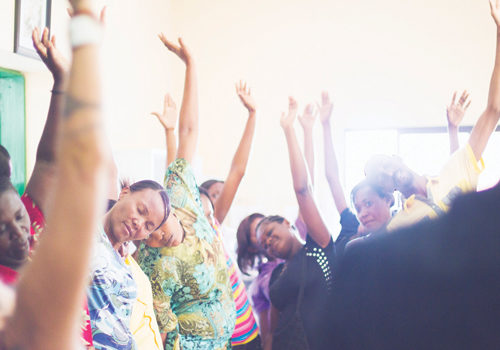
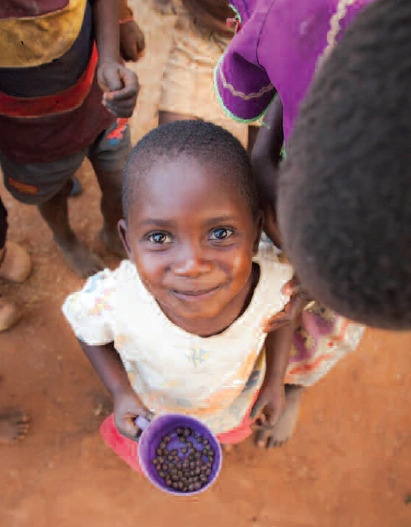

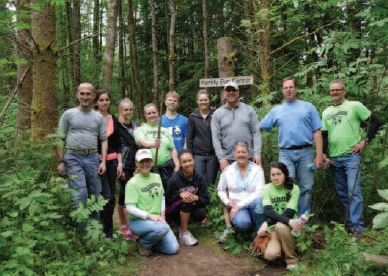 Ferndale, WA, decided to take their desire to help people to a new level. They’ve described this as the process of paving a Pathway to a Better Life, and it has meant a company-wide emphasis on creating prosperity for others. This paradigm shift, according to Bruce Barlean, has seen the company begin to view the business of selling products quite differently. Now more than mere nutritional supplements, their products have become a vehicle for traveling down the Pathway they’ve chosen as a company.
Ferndale, WA, decided to take their desire to help people to a new level. They’ve described this as the process of paving a Pathway to a Better Life, and it has meant a company-wide emphasis on creating prosperity for others. This paradigm shift, according to Bruce Barlean, has seen the company begin to view the business of selling products quite differently. Now more than mere nutritional supplements, their products have become a vehicle for traveling down the Pathway they’ve chosen as a company.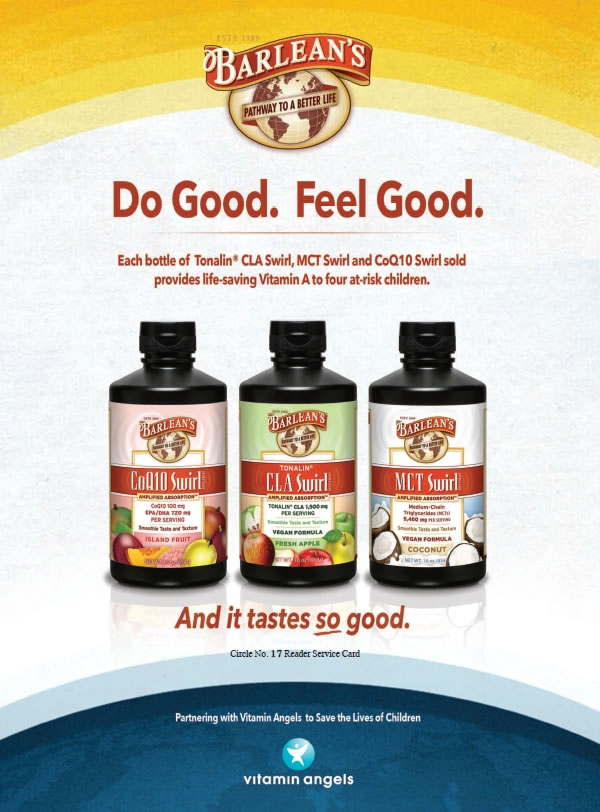
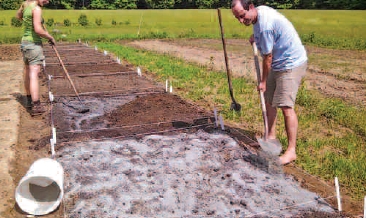 Remineralize the Earth (RTE) and by creating the Bionutrient Food Association. The company also publishes Organic Connections, which is available for free and “features profiles on people and organizations that are contributing to a new culture, based on connection with our environment and with each other, in a way that goes beyond personal or business interests,” according to Whitman.
Remineralize the Earth (RTE) and by creating the Bionutrient Food Association. The company also publishes Organic Connections, which is available for free and “features profiles on people and organizations that are contributing to a new culture, based on connection with our environment and with each other, in a way that goes beyond personal or business interests,” according to Whitman.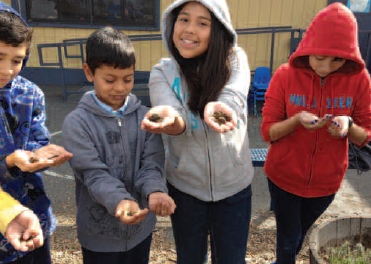


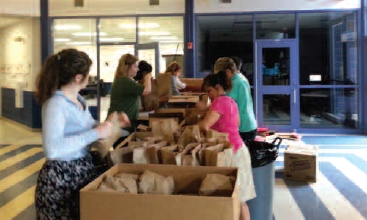 Christmas gifts to struggling families, according to GOH director Meghan Connell. Among other programs, GOH funds School Days, which provides new shoes and school supplies to children, and funds a college scholarship program for local graduating high school seniors.
Christmas gifts to struggling families, according to GOH director Meghan Connell. Among other programs, GOH funds School Days, which provides new shoes and school supplies to children, and funds a college scholarship program for local graduating high school seniors.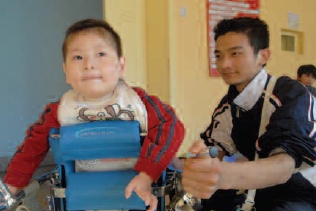 In 2003, Prince of Peace Children’s Home (POPCH) opened in Tianjin, China, as the first official foreign-run children’s home in the country. Funded by POPF and managed by World Vision International, POPCH is built on 1.5 acres of land with 49,000 ft2 of floor space, and the facility can accommodate 120 children. “It can provide rehabilitation services to those with special needs. In addition to bedrooms, classrooms, a computer room, a multipurpose room and many playrooms, the facility has rehabilitation-specific rooms, including sensory stimulation, water therapy and physical therapy,” says Quan.
In 2003, Prince of Peace Children’s Home (POPCH) opened in Tianjin, China, as the first official foreign-run children’s home in the country. Funded by POPF and managed by World Vision International, POPCH is built on 1.5 acres of land with 49,000 ft2 of floor space, and the facility can accommodate 120 children. “It can provide rehabilitation services to those with special needs. In addition to bedrooms, classrooms, a computer room, a multipurpose room and many playrooms, the facility has rehabilitation-specific rooms, including sensory stimulation, water therapy and physical therapy,” says Quan.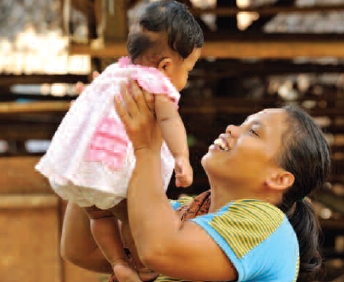 may even cut out the middle-man in the process. They follow a “one-for-one” model, in which they donate one of their actual products (or a form of it) to those in need for every product purchased by consumers. Somewhat unlike money or time, the two other means of enacting charity, the direct donation of goods has a tangible and easy to trace impact on the lives of recipients. Of course, consumers appreciate this giving spirit, and it often makes them more disposed to investigate and become fans of companies that do this. Here are a few examples:
may even cut out the middle-man in the process. They follow a “one-for-one” model, in which they donate one of their actual products (or a form of it) to those in need for every product purchased by consumers. Somewhat unlike money or time, the two other means of enacting charity, the direct donation of goods has a tangible and easy to trace impact on the lives of recipients. Of course, consumers appreciate this giving spirit, and it often makes them more disposed to investigate and become fans of companies that do this. Here are a few examples: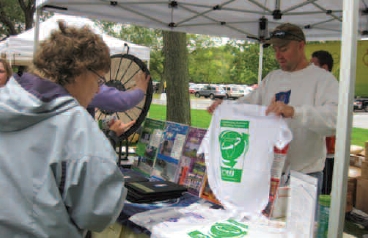 Wong says that Powers helped the company’s charity efforts acquire more structure, and began a relationship with Compassion International. “Later, we developed a charity committee, and put in the work to ensure that any charity we donated to fit with our mission and our values,” she says. Part of the committee’s job is to make sure the charities NOW Foods gets involved with are efficiently run and highly rated by groups like Charity Navigator.
Wong says that Powers helped the company’s charity efforts acquire more structure, and began a relationship with Compassion International. “Later, we developed a charity committee, and put in the work to ensure that any charity we donated to fit with our mission and our values,” she says. Part of the committee’s job is to make sure the charities NOW Foods gets involved with are efficiently run and highly rated by groups like Charity Navigator.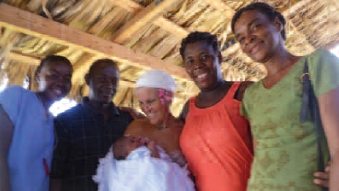 we worked with this retailer to support a program that allowed us to donate product in their name,” says Sugarek MacDonald. Bluebonnet holds the belief that we are all citizens of the world. Unfortunately, she explains, our world must contend with a growing population in the face of limited resources, and this is why the company chooses to provide nutritional supplements in places where they are needed most, including its own backyard. The company donates multivitamin, mineral formulas and protein powders to food banks in various cities across the country.
we worked with this retailer to support a program that allowed us to donate product in their name,” says Sugarek MacDonald. Bluebonnet holds the belief that we are all citizens of the world. Unfortunately, she explains, our world must contend with a growing population in the face of limited resources, and this is why the company chooses to provide nutritional supplements in places where they are needed most, including its own backyard. The company donates multivitamin, mineral formulas and protein powders to food banks in various cities across the country.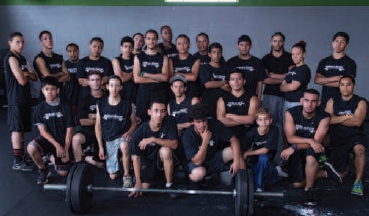 The “PaleoGoods” line took off as it began to be sold online, and new items like jerky, dried fruit and dressings were added. In 2010, this momentum allowed the Steve’s Club National Program to be established. The company uses 15% of the proceeds from the sale of its Paleo diet-friendly goods to fund the National Program. “Steve’s Club is where we started—it’s our passion and the driving force behind what we do. It will always be at the core of what we do,” says Liberati.
The “PaleoGoods” line took off as it began to be sold online, and new items like jerky, dried fruit and dressings were added. In 2010, this momentum allowed the Steve’s Club National Program to be established. The company uses 15% of the proceeds from the sale of its Paleo diet-friendly goods to fund the National Program. “Steve’s Club is where we started—it’s our passion and the driving force behind what we do. It will always be at the core of what we do,” says Liberati.






